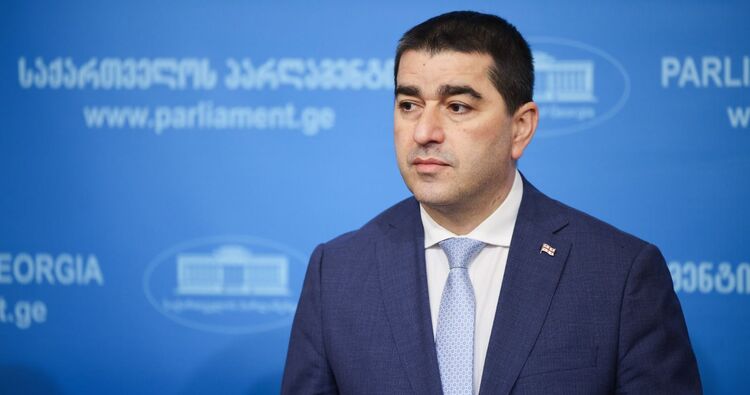Parliament Speaker claims "politically affiliated" NGOs “pose threat” to Georgia's democracy

The chief legislator also emphasised that “foreign actors, NGOs, and media instead of improving the democratic environment in Georgia”, tilted the playing field “in favour of certain political forces, thus depriving the population of their right to make an informed political choice at the elections”. Photo: Georgian Parliament
Georgian Parliament Speaker Shalva Papuashvili on Friday claimed in the run-up to upcoming October 26 general elections, the activities of certain domestic “politically affiliated” civil society organisations “posing as impartial election observers” had become an “issue” for the country’s democracy.
Some of the NGOs are directly linked or even affiliated with formal political parties, sometimes even bearing the same names as the parties, such as Droa or For People. We had an instance when the leadership of an NGO, the Eastern European Centre for Multiparty Democracy, simply transfigured themselves into a full-blown political party, ‘Freedom Maidan,’” he emphasised.
[ ] …The Anti-Corruption Bureau [of Georgia], which is responsible for monitoring political party financing, declared the NGO Vote for Europe as an entity with electoral objectives. NGOs criticised this decision as an instance of harassment of civil society. However, within a few days, two leading figures of this NGO ended up in leading positions on the opposition’s electoral party list”, Papuashvili said.
The Speaker noted it was “obvious” the “agenda of the NGOs and media was “blatantly political”, adding they had “constantly” called for a “change of authority and, at some point, even demanded the formation of a technical government for Georgia, which they said they would run after deposing” the ruling Georgian Dream party.
For instance, the Open Society Foundations, Transparency International Georgia’s, Georgia’s Young Lawyers’ Association or the International Society for Fair Elections and Democracy message boxes, narratives, and sequencing of topics are fully synchronised with the opposition political parties, such as the United National Movement, Lelo, or Ahali and their affiliates. Similarly, such media outlets as TV companies Mtavari, Pirveli, or Formula provide propagandistic platforms for the same parties, respectively for Ahali, Lelo, and the UNM”, he said.
The official further stressed that “beyond their political agendas and broadcasting”, the finances of several domestic NGOs and media outlets often “directly serve the political parties” and were also “directly funded from abroad” through “democracy assistance grants and programs”.
In other words, foreign money flows into politics. Georgian legislation explicitly forbids foreign funding of politicians and parties. This norm makes direct or veiled foreign-funded political activities illegitimate and even plain illegal. Recently, some NGOs openly declared they are going to violate the law by disobeying the legislation on transparency of foreign influence. Such explicit disobedience goes beyond their hitherto tacit violation of legal norms and openly challenges the authority of the state”, Papuashvili noted.
The chief legislator also emphasised that “foreign actors, NGOs, and media instead of improving the democratic environment in Georgia”, tilted the playing field “in favour of certain political forces, thus depriving the population of their right to make an informed political choice at the elections”.
Papuashvili also commented on recent research conducted by the ruling Georgian Dream party, which revealed that 26 out of the 49 NGOs that registered as local election observers were “directly linked” with opposition political parties, saying the “public linkages manifest themselves in that founders, board members, management, and executives of these observers were simultaneously members of political entities or donated money to them”.
 Tweet
Tweet  Share
Share